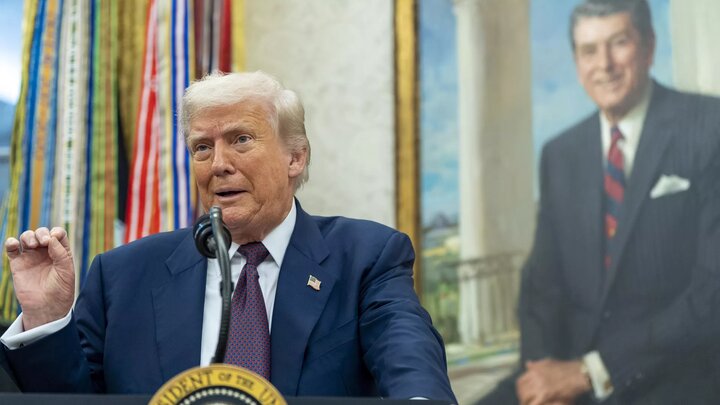White House Spin: What Is Trump’s Goal in Claiming Talks with Iran?

webangah news Agency, International Desk: Amid Crown Prince Mohammed bin Salman’s visit to the White House, Donald Trump once again made a claim swiftly denied by the Iranian government. Trump stated, “I believe Iran is eager for a deal, and we have initiated a process.” However, Iran’s Foreign Ministry spokesperson explicitly said there is “no negotiation process between Tehran and Washington,” calling the claim baseless. Why then does Trump blatantly lie?
Fabricated Achievements in Foreign Policy
To understand Trump’s behavior, one must consider his consistent pattern over recent years. During his first term, he repeatedly sought to manufacture victories that did not exist by exaggerating and distorting facts. He spoke of a “historic peace on the Korean Peninsula,” despite all efforts stalling after a few symbolic meetings. He declared ”Middle East wars are over,” yet conflicts persisted or even intensified.
He promoted the Abraham Accords as a “major breakthrough,” even though these agreements largely failed to resolve fundamental regional issues and mostly held symbolic value. This pattern reveals that rather than relying on facts,Trump prefers crafting narratives to create political wins for himself. He knows that much of his base cares less about truth verification than about stories showing his strength. In this context, claiming talks with Iran helps him project an image of controlling the situation and personal authority.
This tendency has grown amid steep declines in Trump’s domestic popularity during his second term-from 47% down to approximately 38%. Such setbacks increase his need to fabricate external victories using diplomatic storytelling as a tool for restoring credibility. While he cannot change reality, he reshapes narratives to preserve his political standing.
The Psychological Need for Visibility Driving Narrative Fabrication
Political psychology analyses highlight Trump’s chronic need for visibility-he expects constant media attention with daily headlines featuring him. For someone like him, absence from public focus poses psychological threats.
This urge explains why actual events are often irrelevant; if no news exists, Trump creates it himself repeatedly. His claim of talks with Iran fits this logic precisely: it positions him as the key Middle East actor while casting him again as an international crisis manager in U.S. media coverage.
The timing was not coincidental either: bin Salman’s presence at the White House provided an ideal backdrop for Trump to spotlight Iran anew-and suggest publicly that he manages critical regional files-filling gaps left by real achievements while feigning continued centrality in complex Middle Eastern affairs.
Managing Regional Allies
An additional layer relates to Trump’s regional calculations: Saudi Arabia has embarked on easing tensions with Iran after years of confrontation and no longer favors direct conflict like before. In this environment, Trump fears customary U.S.-allies might perceive washington losing its central role in regional dynamics.
Aiming at them especially-with remarks like “Iran wants an agreement”-he signals continued control over Iranian matters remains firmly with him-conveying that Washington still dominates regional security frameworks.
He insists no progress occurs without American involvement; even Tehran supposedly returns reluctantly under U.S.pressure towards dialog.
This messaging especially resonates with bin Salman who accompanies Saudi efforts toward detente but worries about declining American security commitments too.
Thru such claims,Trump attempts reassurance-that although america’s real influence has waned somewhat-it remains decisive powerbroker nonetheless.
Psychological Pressure on Iran
Trump and his national security team understand well how announcing dialogue initiation when Tehran denies it exerts psychological pressure.
This tactic aims not genuinely at negotiations but at creating perceptions inside Tehran of discord or indecision.
Similar strategies surfaced during Trump’s first administration when he repeatedly mentioned contacts from Iran which never occurred-the sole purpose being psychological pressure reinforcing narratives of strength.
These efforts seek forcing Iranian responses or defensive public postures amid media scrutiny.
This time too-inspired by limited U.S.attacks inside Iranian territory-Trump implies those strikes pushed Tehran toward talks-even though ground realities confirm no meaningful shift occurred regionally.
Facing unchanged balances despite military action leaves only narrative fabrication as recourse,
suggesting supposed pressure success even if untrue:
an admission incapable truly changing power dynamics Cyprus wide-but building illusionary influence through storytelling rather.
Conclusion
Trump’s assertion regarding ongoing dialogue with Iran is neither accidental nor diplomatic confusion but follows entirely predictable patterns:<built false victories,bent facts compensate foreign policy failures,mobilize domestic opinion staymedia center,message allies maintainimage exertpsychologicalpressureonIran..His claims veil internal-external weaknesses attempting portray effective americanpower success s apparentalthough firmlydeniedbyIranaswellusregionalfacts.That statementreflectsnotrealitybutpersona lpoliticalpsychologicalneeds drivinghimcreate stories where none existtoremain principal playerinIrancrisis."


